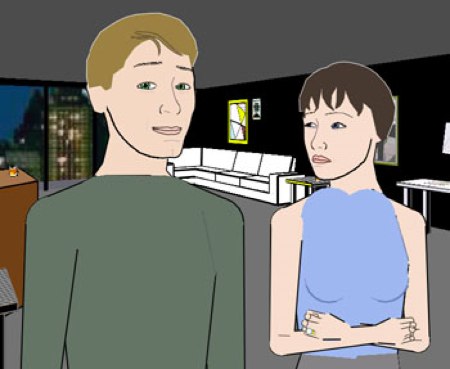Games Of The Decade 1
Stacey Mason

Over the last ten years, the gaming industry has seen huge innovations in how games are able to tell stories. From creative use of new technologies to an emphasis on the player’s experience of a particular narrative, several innovative games have shaped the way games are played, and also how they are viewed by non-gamers and academe.

We’ve been asking some of the best scholars and critics of games to single out one important game from the past decade. We start with Jim Whitehead from the University of California at Santa Cruz, who is perhaps best known for his pioneering work on WebDAV.
Facade is the breakthrough game of the decade because it demonstrates that you can have dialog-driven gameplay with rich characters where the player has a large degree of influence over what transpires. In the game, you take on the role of a friend of a 20-something married couple, Trip and Grace, interacting with them via conversational natural language. Trip and Grace respond to you--and each other--in real time, both with spoken and body language. During the game, you help the couple work through deep troubles in their relationship, and how you talk to them determines whether they stay together, split apart, or throw you out of their apartment.
Today, the typical computer game provides shallow choices for talking with other characters. You are limited to a small number of choices in what to say, and many times these choices have limited to no effect on the game. Dialog is arranged in large trees of predefined choices and responses. Characters seemingly forget what they have said to you in the past, or say things that expose serious continuity problems. In contrast, Trip and Grace in Facade have internal emotional models, conversational models, and goals they are trying to achieve in their interactions with each other, and the player. They have some ability to remember what you have said. This leads to open conversation that can run in many potential directions, and a feeling of freedom of expression in your interactions. You can literally say anything to these characters.
Facade is not without flaws. Though the faces of Trip and Grace are fully procedural, an impressive feat where they are generated by the computer on-the-fly while the game is running, they compare poorly with the artistry of professional games. Like any work of fiction, a willingness to engage the world as-presented is important to preserve the illusion of reality. It is certainly possible to find the limits of Facade. In one example, a player pretends they have been shot in the street before entering Trip and Grace's apartment; Trip offers the player a drink. But, at its best, Facade makes you feel like you are really in that apartment, adrenaline flowing, nervous, struggling along with Trip and Grace to find a way out, to discover what you can possibly say to make the other person *understand*, to make everything all right. But just like in the real world, sometimes that isn't possible.
